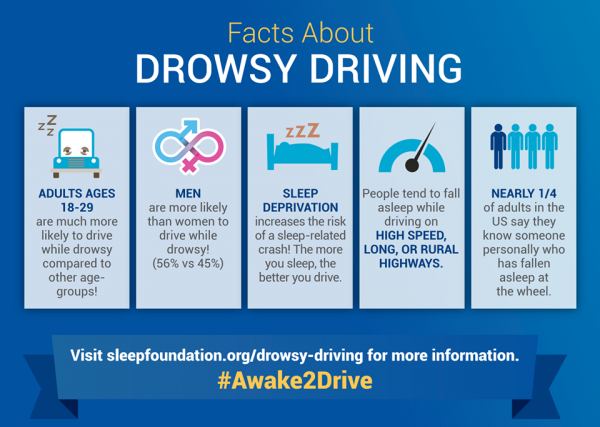 Nov. 6–13 is Drowsy Driving Prevention Week. The purpose of the week is to create awareness of the dangers of drowsy driving.
Nov. 6–13 is Drowsy Driving Prevention Week. The purpose of the week is to create awareness of the dangers of drowsy driving.
Through a Center for Transportation Safety (CTS) funded survey, researchers found that about one in four people (23.6 percent) said they had driven drowsy within the past week. Almost 40 percent said they had driven drowsy within the past month.
Other notable findings were:
- 17 percent reported they had completely fallen asleep behind the wheel at some point in their lifetime.
- 35 percent have the opinion that drowsy driving is unavoidable.
- Over half of the survey respondents did not recall hearing any warnings on the dangers of drowsy driving in the past several years.
The survey, conducted in July 2016, had 200 respondents.
Signs of being too fatigued to drive may include difficulty focusing, heavy eyelids, daydreaming, drifting out of the lane, yawning, and feeling restless or aggressive.
“In the late fall and winter months, shorter days translate to more driving during nighttime hours,” says CTS Director Robert Wunderlich. “The best way to prevent drowsy driving is to get enough sleep before you get behind the wheel and to know when you’re too tired to drive.”
 To help mitigate the risks of drowsy driving and nighttime driving, the National Sleep Foundation recommends:
To help mitigate the risks of drowsy driving and nighttime driving, the National Sleep Foundation recommends:
- Get enough sleep before you drive. Most adults need 7-9 hours per night.
- If you’ve been up for 24 hours or more, do not drive.
- If you feel sleepy, drink something with caffeine.
- If you’re a road trip, try stopping for a break every 100 miles or every two hours on the road.
- Travel during times when you are normally awake.
- If all else fails, find someplace safety to take a nap, or stay somewhere for the night.
For more information on drowsy driving, visit sleepfoundation.org.